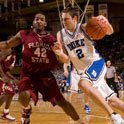Wednesday, July 11, 2007
The NBA Draft was held in New York City a couple of weeks ago and was televised, as all professional sports drafts are these days, on ESPN. I found myself compelled to watch—not to see players' dreams of glory and riches become fulfilled by signing contracts with NBA teams, but rather to watch them plummet to the no-man's land of the second round. My target for a draft-day upset this year was Duke's Josh McRoberts.
Before I start, let me say that McRoberts is probably a really decent guy. He seems friendly enough on the court, and he certainly has not done anything to warrant any sort of personal animosity. But there were plenty of reasons to root against him on draft night.
Josh McRoberts is a product of the Duke University basketball program—the New York Yankees of college basketball. Duke wins every year and somehow manages to attract the best high-school players in the country—despite the fact that their team is so deep that these players will probably begin their college careers on the bench. Having Duke on your resume in college basketball is the equivalent of graduating from MIT if you want a job in technology. You are going to get a shot somewhere, even if you aren't particularly good at what you do.
McRoberts decided to leave Duke after his sophomore year, giving up his final two years of eligibility—something that players generally do only if they are a surefire first-round pick. However, just about every NBA analyst agreed that McRoberts was a long shot for the first round, and that he would have benefited from at least one more year of college.
There is something especially detestable about seeing a player who is obviously not one of the best players on the floor leave school early for the NBA draft. Even the casual college basketball fan couldn't help but notice that McRoberts seemed curiously outmatched by some of the lower-tier forwards in the ACC, forwards who did not prematurely leave college for the NBA. McRoberts' draft entry was one of many that, over the years, have prevented players like Jackson State's Trey Johnson—who did college basketball the right way and stayed all four years—from getting into the NBA.
Players drafted in the first round automatically earn a set amount of money and a four-year contract (two years guaranteed and two team-option years), whereas in the second round, players have to play their way into a contract by proving themselves at practice or in a summer league. Every year, a large number of second-round picks don't end up making the team that drafted them. Often, these players disappear into the great basketball abyss that is Europe, never to be heard from again.
On draft night, the 20s had arrived, and McRoberts' name was still not called. With the 29th pick, the Phoenix Suns chose Alando Tucker from the University of Wisconsin—another player who stayed all four years at school and blossomed from a role player his freshman year to National Player of the Year runner-up during his senior campaign. Then came the final pick of the first round, which belonged to the Philadelphia 76ers. They opted for Petteri Koponen, a player from Finland that hardly anyone had heard of. To top it off, analysts say Koponen is still a year or two away from even joining the NBA; he just has potential. Another slap in the face to McRoberts.
Finally McRoberts was selected with the seventh pick of the second round. With the selection came a lively discussion by analysts, who chastised McRoberts' for leaving Duke after his sophomore year.
Things ended up working out for McRoberts, though, because the Portland Trailblazers signed him to a two-year contract the following week. At this point, he is significantly richer than the vast majority of people reading this column.
As for the important part of the draft—the players who are projected to be superstars—Greg Oden and Kevin Durant were selected, respectively, by Portland and Seattle. If Oden doesn't earn the Blazers at least one NBA Finals trophy, and Durant doesn't win several scoring titles, they will have failed to live up to their hype. Their picks were inevitable, and hardly the most exciting part of draft night.
The NBA Draft offers a glimpse into something better—something that isn't televised at any other time of the year. We get to watch players who have been standouts at every level of their careers hear the words, "You're just not good enough for us." For some reason, seeing that is just as satisfying as watching other players fulfill their lifelong dreams.
Previous Comments
- ID
- 118377
- Comment
Are you hiring for a sports writer?
- Author
- dpsmith
- Date
- 2007-07-17T18:34:26-06:00
- ID
- 118378
- Comment
"Hiring" is a strong word. ;-) But we do take freelance submissions for sports and most other areas.
- Author
- DonnaLadd
- Date
- 2007-07-17T18:52:50-06:00

Comments
Use the comment form below to begin a discussion about this content.
Sign in to comment
Or login with:
OpenID